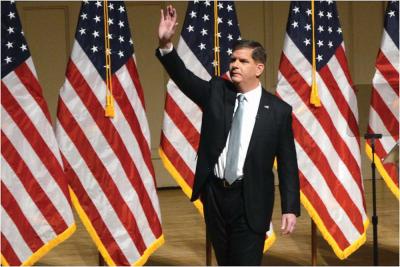January 20, 2016
 Mayor Martin J. Walsh waved to his audience at Symphony Hall during his State of the City speech on Tuesday evening. Chris Lovett photo
Mayor Martin J. Walsh waved to his audience at Symphony Hall during his State of the City speech on Tuesday evening. Chris Lovett photo
Mayor Martin Walsh touted Boston’s progress and announced initiatives to advance education, economic development, housing, and public safety goals in his second State of the City address on Tuesday night at Symphony Hall.
“I know that not just the state of our city but the soul of our city is strong,” the mayor said, pointing to reduced violence and homicide rates, improvements in chronic homelessness, and lower unemployment rates.
Housing is frequently at the top of the list when residents express their hopes and concerns to him, Walsh said. “People want to live in Boston. That’s a good thing. But we need to shape growth as a community, not let it shape us.”
The updated Inclusionary Development Policy, announced in December, is meant to jump-start the flagging middle-income housing market, the mayor said. In his speech, Walsh announced the establishment of a new Office of Housing Stability that he said will offer additional means for those who want to remain in their communities.
“It’s going to develop resources for tenants, incentives for landlords who do the right thing, and partnerships with developers to keep more of our housing stock affordable,” he said.
The Boston Redevelopment Authority will be charged with launching a new planning effort for Glover’s Corner in Dorchester, the mayor said. The study will focus on Freeport Street between Dorchester Avenue and Morrissey Boulevard. Walsh also announced a revived planning study for Dudley Square.
Gov. Charlie Baker, Senate President Stan Rosenberg, House Speaker Robert DeLeo, and members of the Legislature, the city council, and the congressional delegation were on hand to hear the mayor while outside some 100 Boston public school teachers and parents gathered to object to the $50 million in budget cuts announced last week.
As they circled the sidewalk and chanted, the mayor was discussing the steps his administration had taken to set up a more robust school system – the appointment of superintendent Tommy Chang, 24 new principals, plans for redesigning outmoded schools, and an upcoming budget that once again will add money for the schools.
“For the third straight year, I will send a budget to the city council that increases school funding, for a total increase of nearly $90 million since I took office,” Walsh said, noting that parents are “frustrated” about waiting lists for the city’s pre-kindergarten program. “We’ve stretched funding as far as it can go. And we are not alone. I ask leadership at the State House, and every legislator, to work with Boston, with Lawrence, with Salem, with Attleboro, and other cities and towns to expand [access] to high-quality pre-kindergarten. I know we share this priority. Now let’s fund it.”
Commitment to the students is paramount, Walsh said. He briefly touched on the divisive charter school debate, citing the need for “fair and sustainable funding for both district and charter schools.” He also took notice of the parents’ support for a unified enrollment system as another means to level the playing field for all schools.
The mayor also addressed issues that social justice advocates have been pushing for, like better policing practices and a $15-an-hour minimum wage. He spoke admiringly of the Boston Police Department’s commitment to gun safety — over 800 guns removed from the streets in 2015 — and to community policing, and promised “a task force to study a $15-an-hour minimum wage for Boston.”
Walsh used the occasion to emphasize quality of life improvements, like an expansion of public park space; he noted that some six acres will be converted into permanent parks this year.
“We’re going to ensure that America’s first public parks are America’s best, and — inspired by the Martin Richard Playground being built next to the Children’s Museum — America’s most inclusive public parks as well,” the mayor said.
Themes of progress and innovation were invoked throughout the address. Walsh cited the Boston 311 system as a model for better city responsiveness and mentioned the newly unveiled CityScore, a data-driven scoring system meant to hold the city accountable for its governance.
Walsh stayed with his forward-looking theme as he took up the move of the headquarters of General Electric from Connecticut to Boston.
“GE is not only a historic innovator, returning to the city where Thomas Edison got his start,” he said. “It’s not only another step forward for Boston on the world stage. It’s a magnet for talent and investment that we’ll direct toward our shared goals: in opportunity, in community, in education.”
Topics:


